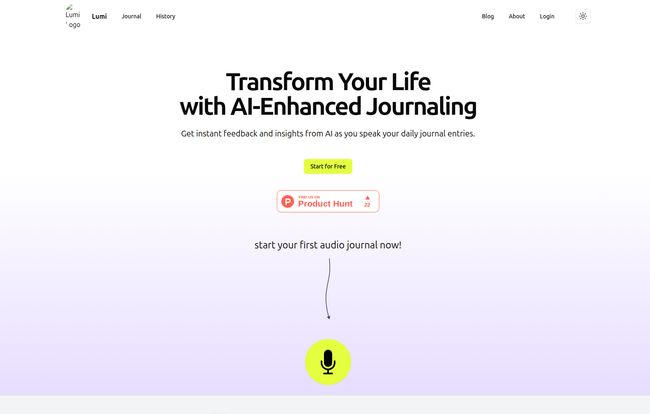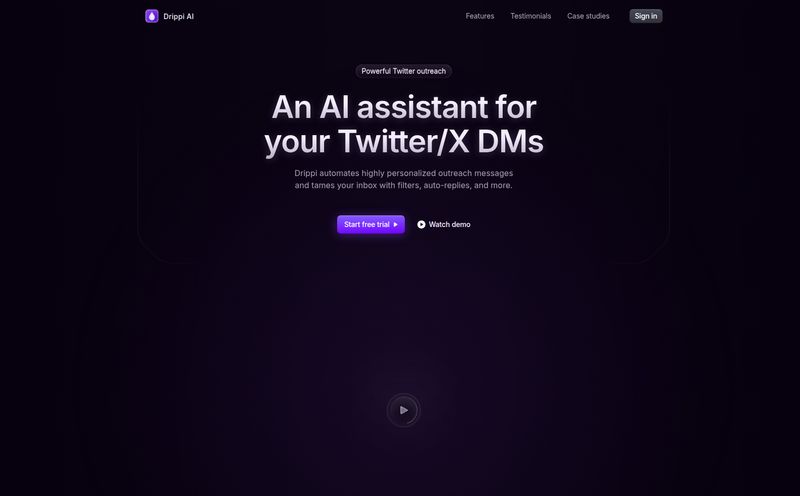I’ve been journaling, on and off, for the better part of a decade. It started with a sleek Moleskine notebook and a fancy pen—the whole nine yards. Most entries began with grand intentions and ended with a half-finished thought about what to have for dinner. Sound familiar? The blank page can be a real tyrant. Sometimes it feels less like a space for reflection and more like a void staring back, silently judging my lack of profound thoughts.
We've all been there. You want the benefits of journaling—the clarity, the stress relief, the self-discovery. But the act of journaling can feel like a chore. A second job you don't get paid for.
So when I stumbled upon LuminaLog, which bills itself as an “AI-Enhanced Journaling” platform, my inner SEO geek and my burnt-out journaler-self both sat up a little straighter. An AI that not only listens but talks back? One that finds patterns in my chaotic ramblings? Okay, I'm intrigued. But also, a little skeptical. Is this just another tech solution looking for a problem, or is it the thing that could finally make my journaling habit stick?
So, What is LuminaLog, Really?
Let's cut through the marketing copy for a second. At its core, LuminaLog is a digital journal. But calling it just a journal is like calling a smartphone just a telephone. The secret sauce is its AI companion. Think of it less as a diary and more as an interactive partner for your thoughts. It’s designed to be a mirror that talks back, helping you see your own reflections from a new angle.
It’s not just a passive receptacle for your brain-dumps. It actively engages with them. It analyzes, asks questions and supposedly, helps you grow. A bold claim. One I had to put to the test.
My First Impressions: Speaking My Mind (Literally)
Getting started was simple. No credit card needed for the free trial, which is always a good sign. The interface is clean, almost calming. None of the chaotic clutter that plagues so many apps today. But the feature that immediately grabbed me was the speech-to-text.
I’m a verbal processor. I often figure things out by talking them through, much to the chagrin of my patient friends. So, instead of typing, I just hit the microphone icon and started talking. Ranting, more like. About a project that was stressing me out, about a weird dream, about my conflicting feelings on pineapple on pizza (it’s a complex issue, okay?).
And it worked. Surprisingly well. The transcription was fast and accurate. There was something incredibly freeing about just speaking, without the friction of my clumsy typing fingers trying to keep up with my train of thought. For those who prefer the classic approach, there's also a slick, Notion-style text editor, so you're not forced to talk to your laptop if you don't want to.

Visit LuminaLog
The Core Features That Actually Matter
An app can have a million features, but usually, only a few make or break the experience. After spending some time with LuminaLog, a few things really stood out as being more than just gimmicks.
The 24/7 AI Companion: A Friend or a Bot?
This is the main event. After I finished my first spoken entry, the AI popped up with a summary and a few questions. Not generic, fortune-cookie questions, but things that were genuinely related to what I’d just said. It asked, “It sounds like this project is causing a lot of friction. What’s one small step you could take tomorrow to feel more in control of it?”
Huh. A simple question, but it cut right through my ranting and forced me to think about solutions. This is where the Pro plan’s “long-term memory” becomes a huge selling point. The idea that the AI can remember what I talked about last week or last month and connect the dots… that’s powerful stuff. It’s the difference between a one-off chat and a continuous conversation.
Uncovering Patterns You Didn't Know You Had
We all have our blind spots. We get stuck in loops, repeating the same emotional or behavioral patterns without even realizing it. LuminaLog's AI is designed to be that objective observer. It will point out sentiments and recurring themes in your entries. Maybe you sound most energized when you talk about a certain hobby, or a specific person’s name consistently pops up when you're feeling anxious. Seeing those patterns laid out can be an ‘aha!’ moment. It’s data-driven self-awareness, which sounds a bit cold, but in practice, it felt surprisingly insightful.
From Journal to Action with Templates
A journal is great for reflection, but what about action? LuminaLog includes templates for things like goal setting and weekly reviews. This helps bridge the gap between thinking about your life and actively shaping it. It nudges you to not just vent, but to plan. The 30-day challenge is a clever bit of gamification to help build the habit, which I appreciate. A little external motivation never hurt anybody.
Journaling on the Go with Telegram
I have to admit, this is a niche feature that I absolutely love. The Telegram integration means you can send a quick thought or a voice note to your LuminaLog journal from your phone, wherever you are. Inspiration doesn’t always strike when you’re sitting at your desk. Sometimes the best ideas come while you’re waiting in line for coffee, and this lets you capture them instantly.
Let's Talk Turkey: LuminaLog Pricing
So, what's the damage? LuminaLog operates on a freemium model, which I think is the right move for an app like this.
| Plan | Cost | Key Features |
|---|---|---|
| Free Trial | $0 | 5 credits/day, basic journaling, document storage, templates, 30-day challenge, and 5 AI chat messages per day. |
| Pro Subscription | $15 / Month | Everything in the Free Trial, plus unlimited chats with the AI and, crucially, the AI's long-term memory. |
Is the Pro plan worth $15 a month? In my opinion, it depends entirely on how you use it. If you're just looking for a place to occasionally type out your thoughts, the free plan is perfectly adequate. But if you're serious about self-improvement and want to really use the AI as a developmental tool, the unlimited chats and long-term memory are what transform LuminaLog from a novelty into a powerful companion. For less than the cost of a few lattes, you get a 24/7 personal analyst. Not a bad deal. You can check out the full details on their pricing page.
The Good, The Bad, and The... AI?
No tool is perfect. After my deep dive, here's my honest breakdown.
What I loved was the sheer convenience of the speech-to-text. It genuinely lowered the barrier to entry for me. The AI's questions were often surprisingly astute, pushing me to think a bit deeper than I might have on my own. It felt like having a coach who was always on call. The encryption is also a big plus, as you're pouring some pretty personal stuff into this thing.
Where I'm a bit hesitant is the classic AI dilemma. First, privacy. Yes, they say it’s encrypted, and I believe them, but handing over your innermost thoughts to a third-party server will always feel a little… weird. It's a hurdle some people won't be able to clear. Second, there's the risk of it becoming a crutch. The goal of self-reflection is to build your own inner wisdom, not to become dependent on an algorithm for insights. It's a tool, not a replacement for your own brain.
Is LuminaLog the Future of Self-Reflection?
This is the big question, isn't it? Is AI the right tool for such a deeply human activity? I can already hear the purists scoffing. But honestly, I think it has its place. For centuries, our tools for reflection have been static: a pen, a piece of paper. They capture thought, but they don't interact with it.
LuminaLog is something different. It's dynamic. It's a conversation. Some research, like a study in the Journal of Social and Personal Relationships, has shown that expressive writing (journaling) has clear therapeutic benefits. I see this as an evolution of that practice. It's not for everyone, and it won't replace traditional therapy or deep, quiet contemplation. But for someone who's stuck, or for the person who needs a little nudge to get started, it could be a game-changer.
It’s not about letting an AI solve your problems. It’s about using it as a springboard to help you solve them yourself.
Final Thoughts
So, am I a convert? I'm definitely a believer in the potential. LuminaLog managed to do what a dozen empty notebooks couldn't: it made journaling feel less like an obligation and more like a discovery. It took the pressure off and added a layer of curiosity and interaction that was genuinely engaging.
If you’ve struggled to maintain a journaling habit, or if you feel like you're just going in circles with your own thoughts, I'd say give the free trial a shot. Talk to it. See what it says back. You might be surprised by the insights you uncover when your journal starts talking back.
Frequently Asked Questions About LuminaLog
- Is LuminaLog really free to use?
- Yes, it has a Free Trial plan that offers a good amount of functionality, including 5 credits per day, free journaling, templates, and 5 daily AI chat messages. For unlimited access and advanced features like the AI's long-term memory, you'll need the Pro Subscription.
- Can I trust LuminaLog with my private thoughts?
- LuminaLog states that user data is encrypted for privacy. While this is a strong security measure, it's always wise to be mindful of what you share with any digital service. The decision ultimately comes down to your personal comfort level with cloud-based platforms.
- Do I have to talk to it, or can I type my journal entries?
- You can do both! It features a great speech-to-text function for verbal journaling, but also includes a clean, Notion-style text editor for those who prefer to type their entries.
- What makes LuminaLog different from a regular notes app like Apple Notes or Google Keep?
- The key difference is the interactive AI. A regular notes app is a passive container for your text. LuminaLog's AI actively analyzes your entries to identify patterns, sentiments, and themes, then engages you with personalized questions and insights to foster self-reflection.
- Can I use LuminaLog on my phone when I'm not at my computer?
- Yes, one of its cool features is a Telegram chatbot integration. This allows you to send text or voice notes directly to your journal from your phone via the Telegram app, making it easy to capture thoughts on the go.
Reference and Sources
- LuminaLog Official Website
- LuminaLog Pricing Page
- Baikie, K. A., & Wilhelm, K. (2005). Emotional and physical health benefits of expressive writing. Advances in Psychiatric Treatment, 11(5), 338-346. (This is a representative study on the benefits of journaling, not a direct citation by LuminaLog).



